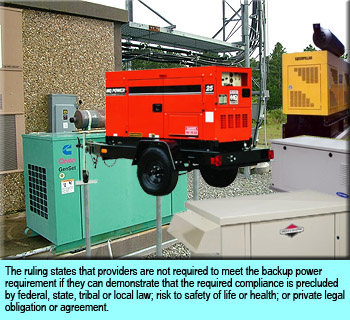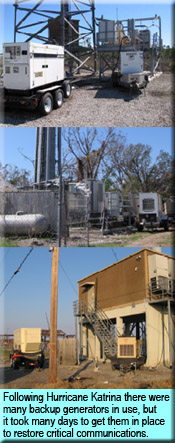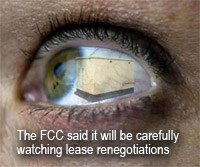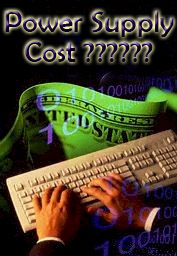|
New eight hour rule will require power backup at all cell sites for every carrier
October 16, 2007 - FCC Commissioner Jonathan Adelstein informed industry executives attending the PCI - The Wireless Infrastructure Association conference on October 2 in Orlando (see prepared text ) that their success will help to fuel the country's economic growth and public safety. October 2 in Orlando (see prepared text ) that their success will help to fuel the country's economic growth and public safety.
On the same day in Washington, the Federal Communications Commission said that to meet national concerns for adequate public safety communications, it had adopted an order reinforcing and clarifying a prior order requiring cell phone and landline carriers within one year to install power backup supplies at all of their sites and to have portable power supplies available for sites that are incapable of having power backup.
The ruling will clearly benefit the economic growth of generator, battery and fuel cell suppliers as well as installation contractors throughout the country. Public safety will be the prime beneficiary, but carriers and other telecom companies will be burdened with considerable expenses that will be incurred in order to meet the FCC's deadline -- impacting Adelstein's wished for success.
The Commission's safety edict will result in increased administrative costs to tower owners to manage the new power supply installations that will ensure eight hours of power backup, but they will benefit from increased lease rates as their tenants expand their compound footprint.
Veiled carrier threats oftentimes ignored
Carriers are finding that most tower owners throughout the country will not agree to a set price for the additional space they will need at a cell site location due to property constraints and lease restrictions. Monthly increases can range from a $1.50 per square foot to as much as $300 for a larger area within a compound.
Veiled threats that the carrier will move their site elsewhere - if the tower owner does not agree to a negotiated rental amount for new space requirements - are typically ignored since relocation costs can be prohibitive.
The order was an outgrowth of the FCC-established Hurricane Katrina Panel's findings that landline and cell phone companies in the impact area did not maintain adequate power backup supplies to keep the telephones operating, and power backup supplies need to be installed at key phone and cell phone locations nationwide.
PCIA had argued that the FCC did not have statutory authority to impose requirements to maintain power backup at cell sites. The FCC said it was enabled to do so under Title 1 of the Federal 1996 Telecommunications Act and the rule was "reasonably ancillary to the effective performance" of the Commission's responsibilities to promote public safety.
Exclusions to rule are provided
The Order On Reconsideration (click here to view OOR ) released October 4, requires that LECs and CMRS providers must maintain emergency power backup for a minimum of 24-hours for assets that are normally powered from local commercial power and located inside central offices, and eight hours for assets that are normally powered from local commercial power and other locations, including cell sites, remote switches and digital loop carrier system remote terminals.
The ruling states that providers are not required to meet the backup power requirement if they can demonstrate that the required compliance is precluded by federal, state, tribal or local law; risk to safety of life or health; or private legal obligation or agreement.
The ruling states that with respect to private legal obligations or agreements, LECs and CMRS providers should make efforts to revise agreements to enable rule compliance, where possible, through renegotiations or renewals.
The Commission emphasized that they will disapprove attempts to circumvent the rule through private agreements.
However, a municipal attorney believes that telecom providers might claim that Federal law preempts, even as to lease terms that prohibit dangerous substances from being stored on the municipal land or building being leased for a cell site.
Municipalities are expected to see considerable activity to install generators and battery backup systems at cell sites on private and public property, including those in the rights of way.
Sensitive site location problems expected
It is expected that some of these installations may cause problems in sensitive community locations such as on the roofs of municipal or school buildings, or on water towers and other locations since the backup systems typically involve gas, diesel or propane powered generators and fuel tanks or batteries with sulfuric acid.
Hydrogen fuel cells are being used on a limited basis by carriers. Although they are environmentally friendly, their cost is a deterrent for mass deployment for an eight hour emergency power supply. Sprint employs the system at slightly more than 200 cell sites, representing approximately 0.25% of their sites.
A concern with fuel cells is the hydrogen gas which is flammable and must be properly ventilated to reduce the risks of an explosion or asphyxiation. This requires that the fuel and fuel cell be installed outdoors or inside a structure with the appropriate safeguards which include gas sensors, ventilation, storing the gas cylinders outside, and for indoor applications, piping in the hydrogen gas via a gas line "fuse."
Lead acid batteries also can produce dangerous amounts of hydrogen while charging.
The FCC ruling has Caterpillar, Inc. floating like a butterfly. The company has been targeting the tower and carrier industry to utilize their UPS and monitoring systems. They have been trying to persuade tower owners to allow them to install a leased generator on raw land sites that other tenants can share, and when its capacity is exceeded they will upgrade the system for new co-locators.
|
Implementation Concerns:
--- Companies will be required to provide power backup systems within 12-months at every site, an ambitious program that will require additional administrative workloads.
--- Power systems contain lead, sulfuric acid, oils and flammable liquids that are subject to a number of federal state, and local environmental and safety laws that strictly limit their placement and use.
--- Many site leases contractually limit the placement of such equipment and may not be able to be renegotiated, although the FCC emphasizes that they should be negotiated.
--- Rooftop locations could expose equipment to lightning or other weather conditions that could compromise the equipment making it more susceptible to fuel leakage and fire.
--- Some locations, such as a church steeple, may not provide adequate ventilation, but this may not be an acceptable "risk to safety of life or health," and the Commission will require the carrier to seek an alternative site.
--- Pollutants emitted by diesel generators have been identified as leading contributors to a variety of environmental and health problems.
--- The 12-month deadline might provide insufficient time to obtain permits, do site inspections and conduct a structural engineering analysis, where required.
--- Lack of space in landlocked compounds or rooftop locations. If there is no space available for power backup the Commission said that carriers should find other locations for their assets.
--- Roofs need to be designed to support the weight of power sources.
--- If fuel requirements exceed above ground storage of more than 1,320 gallons, carriers and tower owners must maintain a Spill Prevention, Control, and Countermeasures plan. Any container holding 55 gallons or more counts towards the total amount of fuel oil at a site.
|
Some carriers have already been hardening their network by adding power backup systems to critical sites in anticipation of the FCC ruling against the petitions for reconsideration of the Katrina Panel recommendations. However, many thousands of the country's cell sites do not have power backup and others that do have power backup supplied do not have the amount required to run for eight hours.
T-Mobile says it provides power backup at 95% of its cell sites, but most have less than eight hours of power.
In the order the FCC declined to exempt cell antennas in non-traditional locations, such as the distributed antenna systems, cellular repeater sites, micro-cell and pico-cell locations, and on electric poles, light poles and flagpoles.
DAS provider NextG uses a fiber-optic cable and small antennas mounted in the public rights-of-way such as utility poles, street lights and traffic signal poles, and will be required to install a backup system for each location.
Battery or fuel cell systems will be necessary for many of these locations and the FCC said that companies must implement reasonable methods and procedures to ensure that batteries are regularly checked and replaced when they deteriorate.
Commission didn't consider cost to carriers
The FCC also stated that the benefits of ensuring power backup for communications assets outweighs any economic burden that communications providers may incur as a result of their rule.
The cost for installing power backup systems was not considered by the FCC and several petitioners unsuccessfully argued that the backup power rule would adversely impact the public interest and Commission policy goals, because the increased expense of compliance will prevent wireless carriers from further deploying their networks in this manner and that this will decrease capacity, coverage and reliability and affect emergency communications and wireless E911 coverage.
Commercial radio service providers with less than 500,000 subscribers are exempt from the power backup rule. The 12-month installation clock will begin ticking after the Office of Management and Budget approves the FCC's new information collection procedures.
|